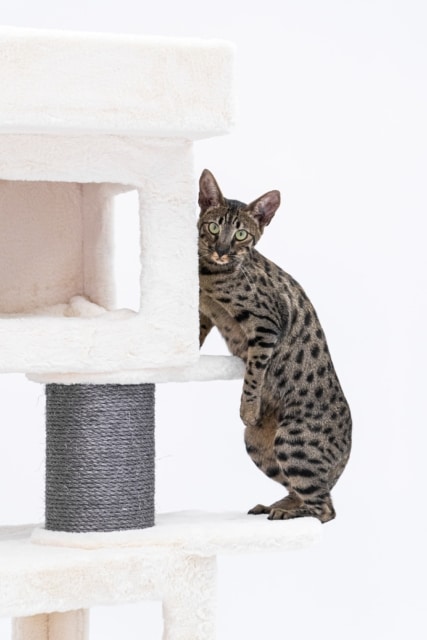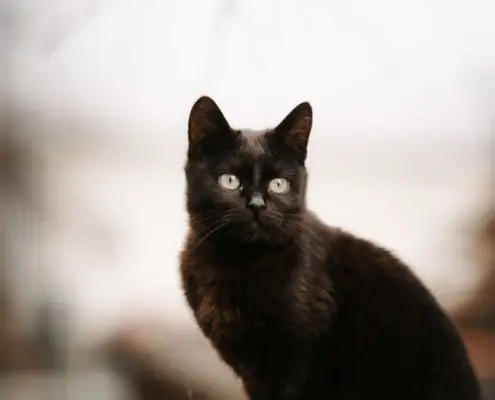Breed Name
Savannah

The Savannah cat breed is a captivating feline that has gained popularity in recent years. With its striking appearance and unique characteristics, the Savannah cat is a perfect blend of elegance and wildness. This article will delve into the history, origin, appearance, personality traits, and care requirements of the Savannah cat breed. Whether you are considering adding a Savannah cat to your family or simply intrigued by these majestic creatures, this article will provide you with a comprehensive understanding of the breed.
History and origin of the Savannah cat breed
The Savannah cat breed originates from a cross between a domestic cat and a serval, a medium-sized wild African cat. The breed was first developed in the 1980s by a Bengal cat breeder named Judee Frank. She aimed to create a cat breed that possessed the striking appearance of a wild cat but maintained the temperament and suitability for domestic life. Through careful selective breeding, the first Savannah cats were born, and the breed began to gain recognition.
Characteristics and appearance of Savannah cats
Savannah cats are known for their distinctive appearance. They have a tall and slender body, with long legs and a small head in proportion to their body. Their ears are large and upright, resembling those of a serval. One of the most striking features of the Savannah cat is their coat, which can vary in patterns and colors. Common coat patterns include spotted, marbled, and striped, with color variations ranging from golden to silver. The coat is short and dense, requiring minimal grooming.
Personality traits of Savannah cats
Savannah cats are highly intelligent and curious creatures. They are known for their playful and energetic nature, often exhibiting dog-like behaviors such as fetching toys and walking on a leash. These cats thrive in an environment that provides mental and physical stimulation, as they have a natural instinct to explore and hunt. Savannah cats are also known to be social, forming strong bonds with their human companions. They enjoy interactive play and can be trained to perform tricks. However, it is important to note that individual personalities can vary, and some Savannah cats may possess more wild traits than others.
Caring for Savannah cats – diet, exercise, and grooming
Proper care and maintenance are crucial for the health and well-being of Savannah cats. A nutritious diet is essential, and it is recommended to feed them a high-quality cat food that meets their specific nutritional needs. Savannah cats are active and require regular exercise to prevent boredom and obesity. Interactive toys and playtime are ideal ways to keep them physically and mentally stimulated. Grooming requirements for Savannah cats are minimal due to their short coat. Regular brushing helps remove loose hair and keeps their coat in good condition.
Health issues and concerns of Savannah cats
While Savannah cats are generally healthy, there are a few health issues and concerns that potential owners should be aware of. One common issue is hypertrophic cardiomyopathy (HCM), a heart condition that can affect some Savannah cats. Regular veterinary check-ups and screenings can help detect and manage this condition. Additionally, Savannah cats may be prone to certain genetic disorders, such as progressive retinal atrophy (PRA) and polycystic kidney disease (PKD). It is important to obtain a health guarantee from a reputable breeder and discuss any potential health concerns before bringing a Savannah cat home.
Legal considerations for owning a Savannah cat
Before considering owning a Savannah cat, it is crucial to understand the legal considerations surrounding the breed. Due to their wild ancestry, some jurisdictions have restrictions or regulations on owning Savannah cats. It is essential to research and comply with the laws in your area to ensure a legal and responsible ownership experience. Additionally, some countries have specific import and export regulations for Savannah cats, so if you plan to travel with your cat, it is important to be aware of these requirements.
Finding a reputable Savannah cat breeder
When looking to add a Savannah cat to your family, it is crucial to find a reputable breeder. A reputable breeder will prioritize the health and well-being of their cats and provide proper socialization from an early age. They will also be knowledgeable about the breed and its specific care requirements. Researching breeders, visiting their facilities, and asking for references can help ensure that you choose a breeder who is committed to ethical breeding practices and the overall welfare of the cats.
Training and socializing Savannah cats
Savannah cats are highly trainable and can learn a variety of commands and tricks. Positive reinforcement techniques, such as treats and praise, are effective in training these intelligent cats. Early socialization is crucial for Savannah cats to develop good behavior and adapt well to different environments. Exposing them to various people, animals, and experiences from a young age will help them become well-rounded and confident cats.
Is the Savannah cat breed right for you?
The Savannah cat breed is a remarkable combination of elegance and wildness. Their striking appearance and unique personality traits make them a fascinating addition to any household. However, owning a Savannah cat requires a commitment to providing proper care, stimulation, and socialization. Before making the decision to bring a Savannah cat into your home, it is essential to thoroughly research the breed, consider your lifestyle and resources, and ensure that you can meet their specific needs. If you are prepared for the responsibilities and challenges of owning a Savannah cat, you will be rewarded with a loyal and extraordinary companion.
If you enjoyed my article, I would appreciate you sharing it with your network.

Sima Ndlebe
Sima writes for CatBuzz. He is interested in Cats, Health and Fitness, and Entrepreneurship.
Published: 10 October 2023



